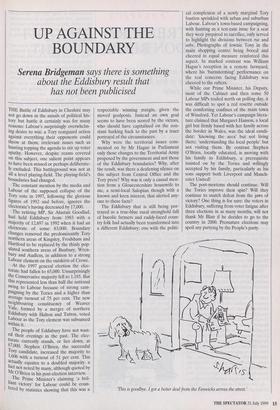UP AGAINST THE BOUNDARY
Serena Bridgeman says there is something
about the Eddisbury result that has not been publicised
THE Battle of Eddisbury in Cheshire may not go down in the annals of political his- tory but battle it certainly was for many reasons: Labour's surprisingly overwhelm- ing desire to win; a Tory rearguard action against everything their opponents could throw at them; irrelevant issues such as hunting topping the agenda to stir up voter apathy. However, despite reams covered on this subject, one salient point appears to have been missed or perhaps deliberate- ly excluded. This battleground was not at all a level playing-field. The playing-field's boundaries had changed. The constant mention by the media and Labour of the supposed collapse of the Tory vote in 1997, following the glorious figures of 1992 and before, ignores the electorate's having decreased by 17,000.
The retiring MP, Sir Alastair Goodlad, had held Eddisbury from 1983 with a majority of 12,697 in 1992 when it had an electorate of some 83,000. Boundary changes removed the predominantly Tory northern areas of Kingsley, Frodsham and Hartford to be replaced by the thinly pop- ulated southern areas of Bunbury, Wren- bury and Audlem, in addition to a strong Labour element on the outskirts of Crewe.
At the 1997 general election the elec- torate had fallen to 65,000. Unsurprisingly the Conservative majority fell to 1,185. But this represented less than half the national swing to Labour because of strong cam- paigning by the Tories and a higher than average turnout of 75 per cent. The new neighbouring constituency of Weaver Vale, formed by a merger of northern Eddisbury with Halton and Tatton, voted Labour as the Tory element was subsumed within it.
The people of Eddisbury have not wast- ed their evenings in the past. The elec- torate currently stands, or lies down, at 0,000. Stephen O'Brien, the successful Tory candidate, increased the majority to 1,606 with a turnout of 51 per cent. This actually equates to a doubled majority: a fact not noted by many, although quoted by Mr O'Brien in his post-election interview. The Prime Minister's claiming 'a bnl- hant victory' for Labour could be coun- tered by statistics showing that this was a respectable winning margin, given the moved goalposts. Instead an own goal seems to have been scored by the victors, who should have capitalised on the con- stant harking back to the past by a truer portrayal of the circumstances.
Why were the territorial issues com- mented on by Mr Hague in Parliament only those changes to the Territorial Army proposed by the government and not those of the Eddisbury boundaries? Why, after the result, was there a deafening silence on this subject from Central Office and the Tory press? Why was it only a casual men- tion from a Gloucestershire housewife to me, a semi-local Salopian though with a known and keen interest, that alerted any- one to these facts?
The Eddisbury that is still being por- trayed as a true-blue rural stronghold full of bucolic farmers and ruddy-faced coun- try folk had actually been transformed into a different Eddisbury; one with the politi- cal complexion of a newly marginal Tory bastion sprinkled with urban and suburban Labour. Labour's town-based campaigning, with hunting as a test-case issue for a seat they were prepared to sacrifice, only served to highlight the divisions between rus and urbs. Photographs of townie Tony in the main shopping centre being booed and cheered in equal measure reinforced this aspect. In marked contrast was William Hague's reception in a remote farmyard, where his 'barnstorming' performance on the real concerns facing Eddisbury was cheered to the rafters.
While our Prime Minister, his Deputy, most of the Cabinet and then some 50 Labour MPs trailed north on polling day, it was difficult to spot a red rosette outside the comforting confines of the main town of Winsford. Yet Labour's campaign litera- ture claimed that Margaret Hanson, a local girl but firmly based with her family across the border in Wales, was the ideal candi- date: 'knowing the area' but not living there; 'understanding the local people' but not visiting them. By contrast Stephen O'Brien, locally educated, is moving with his family to Eddisbury, a prerequisite insisted on by the Tories and willingly accepted by his family, particularly as his sons support both Liverpool and Manch- ester United!
The post-mortems should continue. Will the Tories improve their spin? Will they continue to snatch defeat from the jaws of victory? One thing is for sure: the voters in Eddisbury, suffering from voter fatigue after three elections in as many months, will not thank Mr Blair if he decides to go to the country in 2000. Premature elections may spoil any partying by the People's party.
This is goodbye. I got a better deal from the Fenwicks across the street.'


























































 Previous page
Previous page